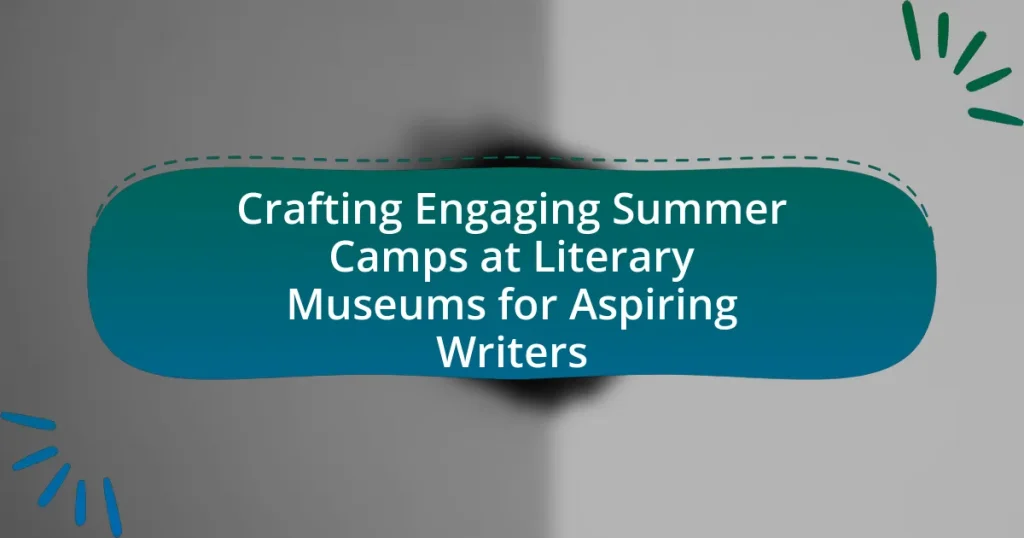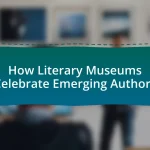Engaging summer camps at literary museums for aspiring writers provide immersive experiences aimed at enhancing writing skills through workshops, mentorship, and exposure to literary history. These camps feature activities such as guided writing exercises, peer reviews, and visits to significant literary sites, fostering creativity and critical thinking. Targeted at age groups from 8 to 18, the programs cater to different developmental stages, offering tailored instruction and resources that support various writing styles. The unique environment of literary museums, combined with skilled facilitators and structured curricula, creates a rich learning atmosphere that nurtures young writers and encourages their growth in the literary field.

What are Engaging Summer Camps at Literary Museums for Aspiring Writers?
Engaging summer camps at literary museums for aspiring writers are immersive programs designed to enhance writing skills through workshops, mentorship, and exposure to literary history. These camps often feature activities such as guided writing exercises, discussions on literary techniques, and visits to significant literary sites, allowing participants to draw inspiration from their surroundings. For example, the Ernest Hemingway Home and Museum offers a summer writing camp that includes hands-on workshops and insights into Hemingway’s writing process, providing a concrete learning experience rooted in the museum’s rich literary heritage.
How do these camps foster creativity and writing skills?
These camps foster creativity and writing skills by providing structured environments that encourage exploration and expression. Participants engage in various writing exercises, workshops, and collaborative projects that stimulate imaginative thinking. Research shows that immersive experiences, such as those offered in these camps, enhance cognitive flexibility and creative problem-solving, which are essential for effective writing. Additionally, mentorship from experienced writers and feedback from peers further develop participants’ writing abilities, reinforcing their skills through practice and constructive critique.
What activities are included to enhance writing abilities?
Activities that enhance writing abilities include workshops, writing prompts, peer reviews, and guided writing exercises. Workshops provide structured learning environments where participants can develop specific skills, such as narrative techniques or character development. Writing prompts stimulate creativity and encourage participants to explore different genres and styles. Peer reviews foster critical thinking and constructive feedback, allowing writers to refine their work. Guided writing exercises, often led by experienced instructors, help participants practice techniques in real-time, reinforcing learning through application. These activities collectively contribute to improved writing proficiency and confidence among aspiring writers.
How do these activities cater to different writing styles?
The activities in summer camps at literary museums cater to different writing styles by offering diverse formats and prompts that appeal to various preferences. For instance, workshops may focus on poetry, fiction, or non-fiction, allowing participants to engage with their preferred genre. Additionally, activities like collaborative storytelling or individual writing exercises provide opportunities for both structured and free-form expression, accommodating those who thrive in guided environments as well as those who prefer creative autonomy. This variety ensures that writers of all styles can find their niche and develop their skills in a supportive setting.
Why are literary museums ideal locations for summer camps?
Literary museums are ideal locations for summer camps because they provide immersive environments that inspire creativity and foster a love for literature. These museums often house original manuscripts, artifacts, and exhibits that connect campers with the lives and works of renowned authors, enhancing their understanding of literary history. For instance, programs at institutions like the Mark Twain House and Museum offer interactive workshops that encourage participants to engage with storytelling techniques and writing styles, directly linking the museum’s resources to practical writing exercises. This combination of historical context and hands-on learning makes literary museums uniquely suited for nurturing aspiring writers.
What unique resources do literary museums offer to aspiring writers?
Literary museums offer aspiring writers unique resources such as access to original manuscripts, author archives, and specialized workshops. These resources provide firsthand insights into the writing process and the historical context of literary works. For instance, many literary museums house rare documents and artifacts that allow writers to study the evolution of literary styles and techniques used by renowned authors. Additionally, workshops often led by experienced writers and literary scholars facilitate skill development and creative exploration, enhancing the overall writing experience for participants.
How does the environment of a literary museum inspire creativity?
The environment of a literary museum inspires creativity by immersing visitors in the rich history and context of literary works. This setting fosters a deep connection to the authors and their creations, stimulating imaginative thinking and new ideas. For instance, the presence of original manuscripts, personal artifacts, and curated exhibitions allows individuals to engage with the creative processes of renowned writers, which can spark their own creative impulses. Studies have shown that exposure to artistic environments enhances cognitive flexibility, leading to increased creativity among participants.
What age groups are targeted by these summer camps?
The summer camps at literary museums for aspiring writers primarily target age groups ranging from 8 to 18 years old. These camps are designed to cater to children and teenagers, providing age-appropriate activities that foster creativity and writing skills. For instance, programs often include workshops tailored for younger children aged 8 to 12, as well as more advanced sessions for teens aged 13 to 18, ensuring that participants receive instruction suited to their developmental stage and writing experience.
How do programs differ for various age ranges?
Programs for various age ranges differ primarily in their content, delivery methods, and objectives. For younger participants, such as children aged 6-10, programs often focus on foundational skills in storytelling and creative expression through interactive activities and games. In contrast, programs for tweens aged 11-13 emphasize developing critical thinking and writing techniques, often incorporating peer feedback and more structured writing exercises. For teenagers aged 14-18, programs typically aim to refine individual writing styles and prepare participants for advanced writing opportunities, including workshops that simulate real-world publishing experiences. This differentiation is supported by educational frameworks that suggest age-appropriate learning strategies enhance engagement and skill acquisition, ensuring that each age group receives tailored instruction that meets their developmental needs.
What specific needs do young writers have at different developmental stages?
Young writers have specific needs that vary by developmental stage, including guidance, feedback, and resources tailored to their skill levels. For early-stage writers, typically ages 5-7, the focus is on fostering creativity through play and basic writing skills, such as letter formation and simple storytelling. As writers progress to ages 8-12, they require structured feedback on their narratives and opportunities to explore different genres, enhancing their understanding of audience and purpose. Teen writers, ages 13-18, benefit from advanced workshops that emphasize critical analysis, peer review, and the development of a unique voice, preparing them for more complex writing tasks. Research indicates that targeted instruction at each stage significantly improves writing proficiency and confidence, as noted in the National Writing Project’s findings on effective writing education strategies.

What are the Key Components of Successful Summer Camps at Literary Museums?
The key components of successful summer camps at literary museums include engaging programming, skilled facilitators, and a focus on hands-on activities. Engaging programming involves creating a curriculum that combines literary education with creative expression, allowing participants to explore various genres and writing styles. Skilled facilitators, often experienced writers or educators, enhance the learning experience by providing mentorship and guidance. A focus on hands-on activities, such as writing workshops, storytelling sessions, and interactive discussions, fosters creativity and encourages participants to apply what they learn in practical ways. These components collectively contribute to a rich and immersive environment that nurtures aspiring writers.
How is the curriculum structured to engage participants?
The curriculum is structured to engage participants through interactive workshops, hands-on activities, and collaborative projects that foster creativity and critical thinking. Each session incorporates elements such as peer feedback, guided writing exercises, and discussions that encourage active participation. Research indicates that experiential learning, which emphasizes active engagement, significantly enhances retention and understanding, making the curriculum effective in maintaining participant interest and involvement.
What types of writing workshops are typically offered?
Writing workshops typically offered include creative writing, poetry, fiction, non-fiction, and screenwriting. These workshops cater to various skill levels and interests, allowing participants to explore different genres and styles. For instance, creative writing workshops often focus on narrative techniques and character development, while poetry workshops emphasize form, meter, and imagery. Fiction workshops may delve into plot structure and dialogue, whereas non-fiction workshops concentrate on memoir writing and essay crafting. Screenwriting workshops provide insights into script formatting and storytelling for film. Each type of workshop is designed to enhance specific writing skills and foster a supportive environment for aspiring writers.
How are guest speakers and authors integrated into the program?
Guest speakers and authors are integrated into the program through scheduled workshops, lectures, and interactive sessions that enhance the learning experience for participants. These sessions allow aspiring writers to gain insights directly from experienced professionals in the literary field, fostering a deeper understanding of writing techniques and industry practices. For instance, renowned authors may lead discussions on their writing processes or provide feedback on participants’ work, thereby creating a dynamic and immersive educational environment.
What role does mentorship play in these camps?
Mentorship plays a crucial role in summer camps at literary museums for aspiring writers by providing personalized guidance and support. Mentors, often experienced writers or educators, facilitate skill development through workshops, feedback sessions, and one-on-one interactions, which enhance participants’ writing abilities. Research indicates that mentorship significantly improves the learning outcomes for young writers, as evidenced by a study published in the Journal of Educational Psychology, which found that students with mentors showed a 30% increase in writing proficiency compared to those without mentorship. This structured support fosters creativity, confidence, and a deeper understanding of the writing process, making mentorship an essential component of these camps.
How are mentors selected and trained for the program?
Mentors for the program are selected based on their expertise in writing and experience in educational settings. The selection process involves reviewing applications, conducting interviews, and assessing candidates’ teaching philosophies and writing backgrounds. Once selected, mentors undergo a comprehensive training program that includes workshops on mentorship techniques, curriculum development, and effective communication strategies. This training ensures that mentors are well-equipped to support aspiring writers in a summer camp environment, fostering a productive and engaging learning atmosphere.
What benefits do participants gain from mentorship?
Participants gain valuable insights and skills from mentorship, which enhances their writing abilities and professional development. Mentorship provides personalized guidance, allowing participants to receive constructive feedback on their work, which is crucial for improvement. Additionally, mentors often share industry knowledge and networking opportunities, helping participants build connections that can lead to future collaborations or job opportunities. Research indicates that mentees report higher levels of confidence and motivation, which are essential for aspiring writers looking to establish their careers in the literary field.
How is participant feedback utilized to improve future camps?
Participant feedback is utilized to improve future camps by systematically analyzing responses to identify strengths and areas for enhancement. This feedback is collected through surveys and interviews, allowing organizers to gauge participant satisfaction and gather suggestions for program adjustments. For instance, if multiple participants indicate a desire for more interactive workshops, camp coordinators can incorporate additional hands-on activities in future iterations. This approach not only enhances the overall experience but also aligns the camp offerings with the specific interests and needs of aspiring writers, ensuring that the programs remain relevant and engaging.
What methods are used to gather feedback from campers?
Surveys and questionnaires are commonly used methods to gather feedback from campers. These tools allow organizers to collect structured responses regarding campers’ experiences, preferences, and suggestions for improvement. Additionally, informal discussions and focus groups can provide qualitative insights, enabling a deeper understanding of campers’ thoughts and feelings about the camp activities and environment. These methods are effective as they facilitate direct communication between campers and organizers, ensuring that feedback is relevant and actionable.
How does feedback influence camp activities and structure?
Feedback directly influences camp activities and structure by providing insights into participant preferences and areas for improvement. This information allows camp organizers to tailor activities to better meet the interests and needs of aspiring writers, enhancing engagement and learning outcomes. For instance, surveys and informal discussions can reveal which writing workshops are most popular or which aspects of the camp experience participants find lacking. By analyzing this feedback, organizers can adjust schedules, introduce new topics, or modify existing programs to create a more effective and enjoyable environment for attendees.

What Best Practices Ensure the Success of Summer Camps at Literary Museums?
Best practices that ensure the success of summer camps at literary museums include developing a curriculum that integrates hands-on writing activities, fostering a connection to the museum’s literary heritage, and providing experienced instructors who can inspire creativity. A well-structured program that emphasizes interactive workshops, author visits, and collaborative projects enhances participant engagement and learning outcomes. Research indicates that experiential learning, such as writing in the context of historical literary settings, significantly boosts creativity and retention of knowledge among young writers. Additionally, effective marketing strategies that target local schools and community organizations can increase enrollment and visibility, contributing to the overall success of the camp.
How can camp organizers effectively promote their programs?
Camp organizers can effectively promote their programs by utilizing targeted marketing strategies that engage their specific audience. This includes leveraging social media platforms, creating visually appealing content, and collaborating with local schools and community organizations to reach potential participants. For instance, a study by the American Camp Association found that 75% of parents prefer to learn about camp options through social media, highlighting its effectiveness as a promotional tool. Additionally, offering early bird discounts and referral incentives can further attract participants, as financial incentives have been shown to increase enrollment rates.
What marketing strategies resonate with aspiring writers and their families?
Effective marketing strategies for aspiring writers and their families include targeted social media campaigns, community engagement events, and partnerships with educational institutions. Social media platforms like Instagram and Facebook allow for direct interaction with aspiring writers, showcasing camp activities and success stories, which can attract families. Community engagement through local workshops or author readings fosters a sense of belonging and encourages participation. Collaborating with schools and libraries can enhance visibility and credibility, as these institutions often serve as trusted resources for families seeking educational opportunities. These strategies are validated by the increasing trend of literary programs gaining popularity through social media outreach and community involvement, demonstrating their effectiveness in reaching the target audience.
How can partnerships with schools enhance visibility and enrollment?
Partnerships with schools can enhance visibility and enrollment by creating direct access to a targeted audience of students and parents. When literary museums collaborate with schools, they can promote summer camps through school newsletters, events, and parent-teacher meetings, effectively reaching families interested in writing and literature. For instance, a study by the National Endowment for the Arts found that arts education programs in schools significantly increase student participation in related extracurricular activities, such as summer camps. This collaboration not only raises awareness of the camps but also builds credibility, as schools are trusted sources of information for parents.
What logistical considerations are crucial for camp planning?
Crucial logistical considerations for camp planning include site selection, resource allocation, and scheduling. Site selection involves choosing a location that is accessible, safe, and conducive to the camp’s activities, ensuring that it can accommodate the expected number of participants. Resource allocation requires identifying and securing necessary materials, equipment, and personnel, which is essential for the smooth operation of camp activities. Scheduling is vital to create a balanced program that maximizes engagement while allowing for adequate breaks and transitions between activities. These considerations are supported by the need for effective management to enhance participant experience and safety, as evidenced by successful camp programs that prioritize these logistical elements.
How should camp schedules be designed for maximum engagement?
Camp schedules should be designed with a balance of structured activities and free time to maximize engagement. Structured activities, such as writing workshops and guided discussions, provide focused learning opportunities, while free time allows for creativity and personal exploration. Research indicates that incorporating varied formats, such as hands-on projects, collaborative tasks, and individual reflection, enhances participant involvement and satisfaction. For instance, a study by the American Camp Association found that camps with diverse programming saw a 30% increase in camper engagement levels. Additionally, scheduling breaks and social interactions fosters a sense of community, which is crucial for maintaining enthusiasm and participation throughout the camp experience.
What safety measures need to be in place for participants?
Safety measures for participants in summer camps at literary museums must include comprehensive emergency protocols, adequate supervision, and health precautions. Emergency protocols should encompass clear evacuation plans, first aid availability, and emergency contact information. Adequate supervision involves maintaining a low participant-to-staff ratio to ensure that all individuals are monitored effectively, which is crucial for preventing accidents and addressing issues promptly. Health precautions should include measures such as ensuring that participants are aware of allergies, providing access to medical assistance, and implementing hygiene practices to prevent the spread of illness. These measures are essential to create a safe environment conducive to learning and creativity.
What tips can enhance the overall experience for campers?
To enhance the overall experience for campers, organizers should incorporate interactive workshops that focus on writing techniques and storytelling skills. These workshops can provide hands-on learning opportunities, allowing campers to engage directly with experienced writers and receive personalized feedback. Research indicates that experiential learning significantly improves retention and skill development, making it a valuable approach in educational settings. Additionally, incorporating group activities, such as collaborative writing projects or peer review sessions, fosters a sense of community and encourages creative collaboration among campers. This social interaction can lead to increased motivation and enjoyment, further enriching the camp experience.
How can organizers create a supportive and inclusive environment?
Organizers can create a supportive and inclusive environment by implementing clear communication, fostering collaboration, and ensuring accessibility for all participants. Clear communication involves setting expectations and providing information in multiple formats to accommodate diverse needs. Fostering collaboration encourages participants to share their ideas and experiences, which enhances community building. Ensuring accessibility includes providing necessary resources, such as materials in various formats and physical accommodations, to support individuals with different abilities. Research indicates that inclusive environments lead to higher engagement and satisfaction among participants, as evidenced by a study from the National Endowment for the Arts, which found that inclusive practices significantly enhance participant experiences in creative settings.
What activities can foster community among participants?
Collaborative writing workshops can foster community among participants by encouraging shared creativity and interaction. These workshops allow aspiring writers to work together on projects, share feedback, and develop their skills in a supportive environment. Research indicates that collaborative learning enhances social connections and builds a sense of belonging, which is crucial in community-building efforts. Additionally, group discussions and peer review sessions create opportunities for participants to engage with one another, further strengthening their community ties.


